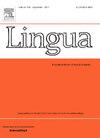L3对汉语普通话学习者L1中引起状态变化事件表达的反向影响
IF 1.3
3区 文学
0 LANGUAGE & LINGUISTICS
引用次数: 0
摘要
以往的研究主要集中在运动事件表达的正向迁移上,而目前的研究忽视了第三语言(L3)对第一语言(L1)中引起的状态变化(CSC)事件的反向迁移的探索。本研究以动画事件描述任务为基础,对33名中英学习者和66名中英日低、高水平学习者进行比较,探讨了从L3到L1对CSC表达的反向影响。结果表明:(1)所有被试群体的词汇化模式均明显遵循卫星框架语言(S-language)特征,主要采用因果紧密性概念拼接模式。(2) L3(日语)类型特征和熟练程度对L1(普通话)CSC表达均有反作用。前者促使汉语-英语-日语学习者更多地关注事件结果,而熟练程度的提高导致结果描述的语义精细程度降低。(3) CSC事件表达的跨组比较反映了语言系统之间的动态相互作用。相似之处表明了母语的特殊作用,而差异则说明了日语类型特征和熟练程度的相反影响。本文章由计算机程序翻译,如有差异,请以英文原文为准。
The reverse influence of L3 on the expressions of caused state change events in the L1 of Mandarin Chinese learners
With the previous predominance of a focus on forward transfer in motion event expressions, current research has overlooked the exploration of reverse transfer of third language (L3) regarding caused state change (CSC) events in the first language (L1). Based on an animated event description task, this study explores the reverse influence from L3 to L1 in CSC expressions, comparing 33 Mandarin–English learners with 66 Mandarin–English–Japanese learners of low and high proficiency. The findings reveal that: (1) All participant groups exhibited significant adherence to satellite-framed language (S-language) features in their lexicalization patterns, predominantly adopting causal compactness conceptual splicing patterns. (2) Both L3 (Japanese) typological features and proficiency exert inverse effects on L1 (Mandarin Chinese) CSC expressions. The former prompts Mandarin–English–Japanese learners to focus more on event results, and increased proficiency leads to reduced semantic fineness in result descriptions. (3) Cross-group comparisons of CSC events expression reflect the dynamic interplay between language systems. The similarities demonstrate the privileged role of L1, while the differences illustrate the reverse effects of Japanese typological features and proficiency.
求助全文
通过发布文献求助,成功后即可免费获取论文全文。
去求助
来源期刊

Lingua
Multiple-
CiteScore
2.50
自引率
9.10%
发文量
93
审稿时长
24 weeks
期刊介绍:
Lingua publishes papers of any length, if justified, as well as review articles surveying developments in the various fields of linguistics, and occasional discussions. A considerable number of pages in each issue are devoted to critical book reviews. Lingua also publishes Lingua Franca articles consisting of provocative exchanges expressing strong opinions on central topics in linguistics; The Decade In articles which are educational articles offering the nonspecialist linguist an overview of a given area of study; and Taking up the Gauntlet special issues composed of a set number of papers examining one set of data and exploring whose theory offers the most insight with a minimal set of assumptions and a maximum of arguments.
 求助内容:
求助内容: 应助结果提醒方式:
应助结果提醒方式:


